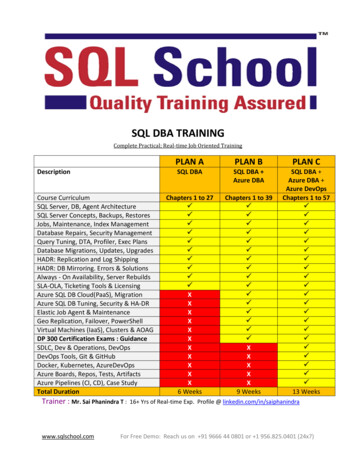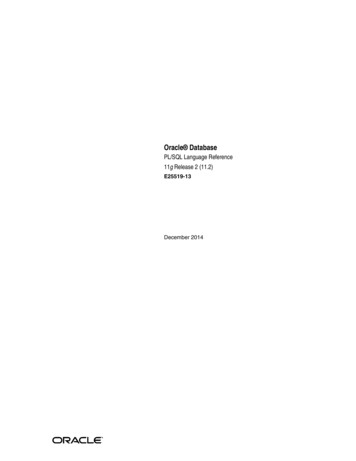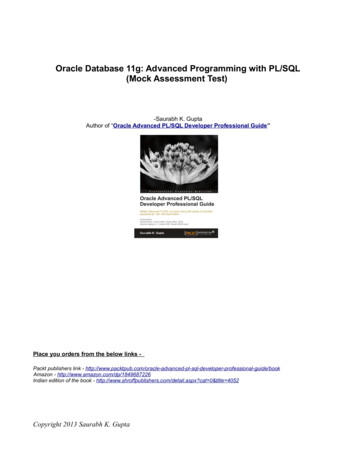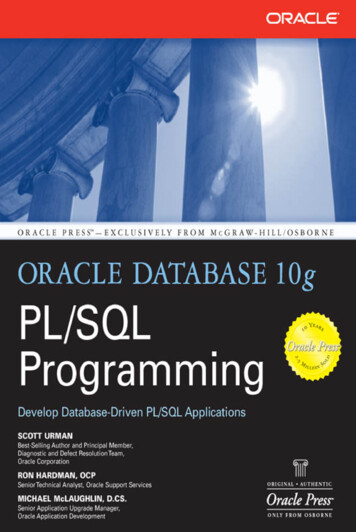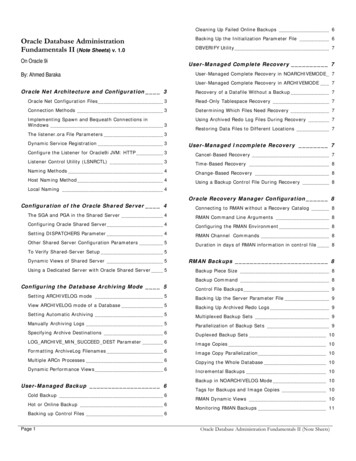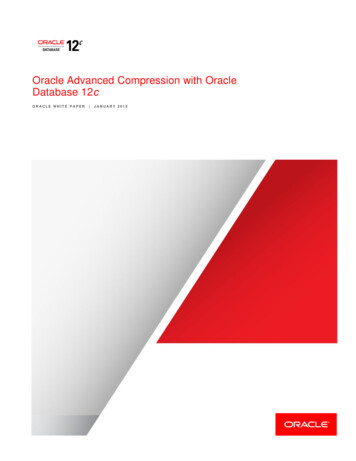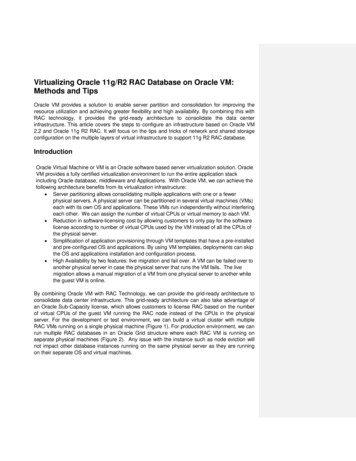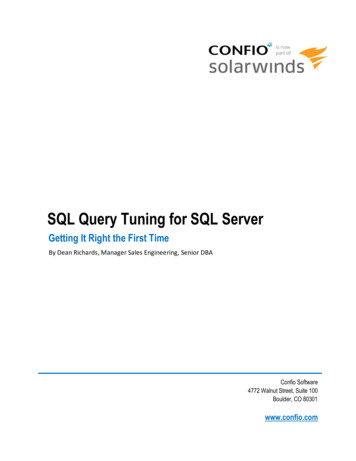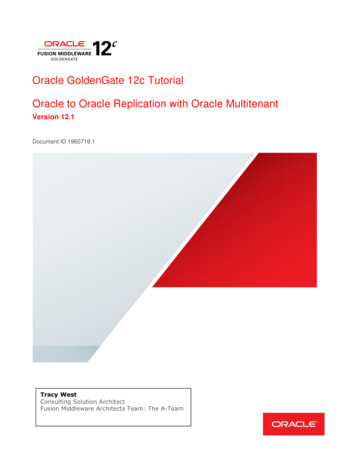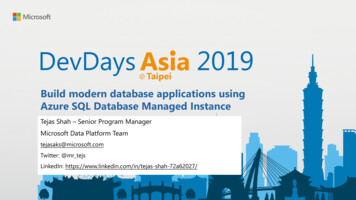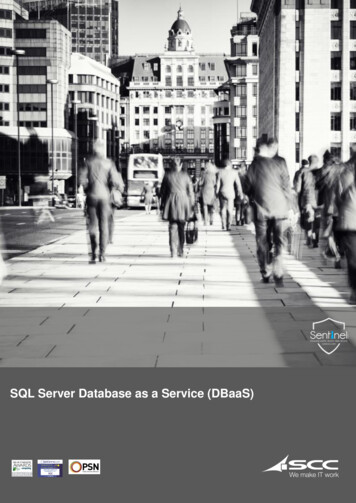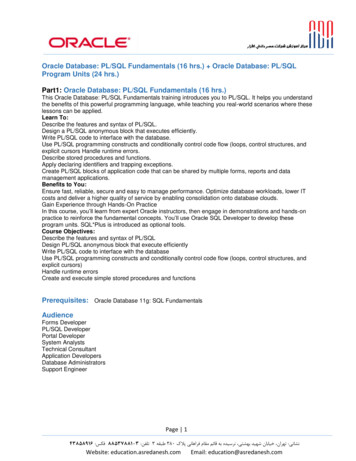
Transcription
Oracle Database: PL/SQL Fundamentals (16 hrs.) Oracle Database: PL/SQLProgram Units (24 hrs.)Part1: Oracle Database: PL/SQL Fundamentals (16 hrs.)This Oracle Database: PL/SQL Fundamentals training introduces you to PL/SQL. It helps you understandthe benefits of this powerful programming language, while teaching you real-world scenarios where theselessons can be applied.Learn To:Describe the features and syntax of PL/SQL.Design a PL/SQL anonymous block that executes efficiently.Write PL/SQL code to interface with the database.Use PL/SQL programming constructs and conditionally control code flow (loops, control structures, andexplicit cursors Handle runtime errors.Describe stored procedures and functions.Apply declaring identifiers and trapping exceptions.Create PL/SQL blocks of application code that can be shared by multiple forms, reports and datamanagement applications.Benefits to You:Ensure fast, reliable, secure and easy to manage performance. Optimize database workloads, lower ITcosts and deliver a higher quality of service by enabling consolidation onto database clouds.Gain Experience through Hands-On PracticeIn this course, you’ll learn from expert Oracle instructors, then engage in demonstrations and hands-onpractice to reinforce the fundamental concepts. You’ll use Oracle SQL Developer to develop theseprogram units. SQL*Plus is introduced as optional tools.Course Objectives:Describe the features and syntax of PL/SQLDesign PL/SQL anonymous block that execute efficientlyWrite PL/SQL code to interface with the databaseUse PL/SQL programming constructs and conditionally control code flow (loops, control structures, andexplicit cursors)Handle runtime errorsCreate and execute simple stored procedures and functionsPrerequisites: Oracle Database 11g: SQL FundamentalsAudienceForms DeveloperPL/SQL DeveloperPortal DeveloperSystem AnalystsTechnical ConsultantApplication DevelopersDatabase AdministratorsSupport EngineerPage 163888884 : فکس 88833888-3 : تلفن 0 طبقه 083 نرسیده به قائم مقام فراهانی پالک ، خیابان شهید بهشتی ، تهران : نشانی Website: education.asredanesh.comEmail: education@asredanesh.com
Course Topics:Introduction Course Objectives, Course Agenda and Class Account Information Describe the Human Resources (HR) Schema Identify the Appendices Used in this Course Introduction to PL/SQL Development Environments Oracle Database 12c SQL Documentation and Additional ResourcesIntroduction to PL/SQL Understanding the benefits and structure of PL/SQL Examining PL/SQL Blocks Generating output messages in PL/SQLDeclaring PL/SQL Variables Identify valid and invalid identifiers Declare and initialize variables List and describe various data types Identify the benefits of using the %TYPE attribute Declare, use, and print bind variablesWriting Executable Statements List Lexical Units in a PL/SQL Block Use SQL Functions in PL/SQL Use Data Type Conversion Use Nested Blocks as Statements Reference an Identifier Value in a Nested Block Qualify an Identifier with a Label Use Operators in PL/SQL Using Sequences in PL/SQL ExpressionsUsing SQL Statements within a PL/SQL Block Identify and use the SQL Statements in PL/SQL Retrieve Data in PL/SQL with the SELECT statement Avoid Errors by Using Naming Conventions When Using Retrieval and DML Statements Manipulate Data in the Server Using PL/SQL The SQL Cursor concept Use SQL Cursor Attributes to Obtain Feedback on DML Save and Discard TransactionsWriting Control Structures Control PL/SQL Flow of Execution Conditional processing Using IF and CASE Statements Handle Nulls to Avoid Common Mistakes Build Boolean Conditions with Logical Operators Use Iterative Control with Looping StatementsWorking with Composite Data Types Learn the Composite Data Types of PL/SQL Records and Tables Use PL/SQL Records to Hold Multiple Values of Different TypePage 263888884 : فکس 88833888-3 : تلفن 0 طبقه 083 نرسیده به قائم مقام فراهانی پالک ، خیابان شهید بهشتی ، تهران : نشانی Website: education.asredanesh.comEmail: education@asredanesh.com
Inserting and Updating with PL/SQL RecordsUse INDEX BY Tables to Hold Multiple Values of the Same Data TypeUsing Explicit Cursors Define Cursors Explain Explicit Cursor Operations Controlling Explicit Cursors Use Explicit Cursors to Process Rows Cursors and Records Cursor FOR Loops Using Subqueries Explicit Cursor Attributes The %NOTFOUND and %ROWCOUNT AttributesHandling Exceptions Define Exception Handling Exceptions with PL/SQL Predefined Exceptions Trapping Predefined and Non-predefined Oracle Server Errors Functions that Return Information on Encountered Exceptions Trapping User-Defined Exceptions Propagate Exceptions Basic RAISE StatementCreating Stored Procedures and Functions Overview of Stored Procedures and Functions Differentiate between anonymous blocks and subprograms Show the CREATE OR REPLACE PROCEDURE FUNCTION Understand the Header Area of a Stored Procedure and Function Create Simple Procedures and Functions Create a Simple Procedure with an IN Parameter Execute a Procedure and a FunctionPage 363888884 : فکس 88833888-3 : تلفن 0 طبقه 083 نرسیده به قائم مقام فراهانی پالک ، خیابان شهید بهشتی ، تهران : نشانی Website: education.asredanesh.comEmail: education@asredanesh.com
Part2: Oracle Database: Develop PL/SQL Program Units (24hrs.)This Oracle Database: Develop PL/SQL Program Units course is designed for developers with basicPL/SQL and SQL language skills. You will learn to develop, execute and manage PL/SQL stored programunits, which include: procedures, functions, packages and database triggers.Learn To:Create, and execute stored procedures and functions.Design and use PL/SQL packages.Create overloaded package subprograms for more flexibility.Utilize Oracle supplied packages in application development.Create triggers to solve business challenges.Build and execute SQL statements dynamically.Manage PL/SQL subprograms and triggers.Understand and influence the PL/SQL compiler.Manage dependencies.Benefits to You:Ensure fast, reliable, secure and easy to manage performance. Optimize database workloads, lower ITcosts and deliver a higher quality of service by enabling consolidation onto database clouds.Learn Dynamic SQL, Design Considerations and More.This course will also teach you how to useDynamic SQL through instruction, as well as hands-on exercises. Expert Oracle instructors will also helpyou understand design considerations when coding using PL/SQL.Using Oracle SQL Developer In addition, you’ll use Oracle SQL Developer as the main environment toolto develop these program units. SQL*Plus is introduced as optional tools. Demonstrations and hands-onpractice reinforce the fundamental concepts you’ve learned throughout the course.Course Objectives:Create, use, and debug stored procedures and functionsDesign and use PL/SQL packages to group and contain related constructsCreate overloaded package subprograms for more flexibilityUse the Oracle supplied PL/SQL packages to generate screen output, file output, and mail outputWrite dynamic SQL for more coding flexibilityDesign PL/SQL code for predefined data types, local subprograms, additional programs and standardizedconstants and exceptionsUse the compiler warnings infrastructureUse conditional PL/SQL compilation and obfuscate (hide) codeCreate triggers to solve business challengesManage dependencies between PL/SQL subprogramsCourse TopicsIntroduction Course Objectives, Course Agenda and Appendixes Used in this Course Describe the full Human Resources (HR) Schema Review the online Oracle Database 12c SQL and PL/SQL documentation and the additionalavailable resources List the PL/SQL development environments Available in this course Use the SQL Worksheet Execute SQL Statements Work With Script Files Create and Execute Anonymous BlocksPage 463888884 : فکس 88833888-3 : تلفن 0 طبقه 083 نرسیده به قائم مقام فراهانی پالک ، خیابان شهید بهشتی ، تهران : نشانی Website: education.asredanesh.comEmail: education@asredanesh.com
Creating Stored Procedures Describe PL/SQL blocks and subprograms Describe the uses and benefits of procedures Create, call, and remove procedures Use formal and actual parameters Identify the available parameter-passing modes Pass parameters using the positional, named, or combination techniques Handle exceptions in procedures View the procedure informationCreating Functions and Debugging Subprograms Creating Stored Functions The Difference Between Procedures and Functions Developing Functions Creating and Executing and Removing Functions Identifying the Advantages of Using Stored Functions in SQL Statements Using User-Defined Functions in SQL Statements Using a PL/SQL Function in the SQL WITH Clause Restrictions When Calling Functions from SQL statementsCreating Packages Using PL/SQL Packages The Components of a PL/SQL Package The Visibility of a Package’s Components Developing a PL/SQL Package Creating the Package Specification and Package Body Invoking the Package Constructs Creating and Using Bodiless Packages Removing a PackageWorking With Packages Overloading Subprograms Using Forward Declarations to Solve Illegal Procedure Reference Initializing Packages Using Package Functions in SQL and Restrictions Controlling Side Effects of PL/SQL Subprograms Persistent State of Packages Persistent State of Package Variables and Cursors Using PL/SQL Tables of Records in PackagesUsing Oracle-Supplied Packages in Application Development Using Oracle-Supplied Packages Examples of Some of the Oracle-Supplied Packages How Does the DBMS OUTPUT Package Work? Using the UTL FILE Package to Interact With Operating System Files Using the UTL MAIL PackageUsing Dynamic SQL The Execution Flow of SQL Working With Dynamic SQL When Do You Need Dynamic SQL? Using Native Dynamic SQL (NDS) Declaring Cursor VariablesPage 563888884 : فکس 88833888-3 : تلفن 0 طبقه 083 نرسیده به قائم مقام فراهانی پالک ، خیابان شهید بهشتی ، تهران : نشانی Website: education.asredanesh.comEmail: education@asredanesh.com
Executing a PL/SQL Block Dynamically Using Native Dynamic SQL to Compile PL/SQL CodeDesign Considerations for PL/SQL Code Standardize constants with a constant package Standardize exceptions with an exception package Write PL/SQL code that uses local subprograms Grant Roles to PL/SQL Packages and Standalone Stored Subprograms Use the NOCOPY compiler hint to pass parameters by reference Use the PARALLEL ENABLE hint for optimization Use the AUTONOMOUS TRANSACTION pragma to run independent transactions within a singletransactio Describe the differences between invoker rights and definer rightsCreating Triggers Describe different types of triggers Describe database triggers and their use Create database triggers Describe database trigger firing rules Remove database triggersCreating Compound, DDL, and Event Database Triggers Describe compound triggers Describe mutating tables Create triggers on DDL statements Create triggers on system events Display information about triggersUsing PL/SQL compiler Using the PL/SQL CompilerUsing the Initialization Parameters for PL/SQL Compilation Using the PL/SQL Compile Time Warnings Viewing the Current Setting of PLSQL WARNINGS Viewing the Compiler Warnings: Using SQL Developer, SQL*Plus, or the Data Dictionary Views Guidelines for Using PLSQL WARNINGSManaging Dependencies Describe dependent and referenced objects Track procedural dependencies with dictionary views Predict the effect of changing a database object upon stored procedures and functions Manage local and remote procedural dependenciesPage 663888884 : فکس 88833888-3 : تلفن 0 طبقه 083 نرسیده به قائم مقام فراهانی پالک ، خیابان شهید بهشتی ، تهران : نشانی Website: education.asredanesh.comEmail: education@asredanesh.com
This Oracle Database: PL/SQL Fundamentals training introduces you to PL/SQL. It helps you understand the benefits of this powerful programming language, while teaching you real-world scenarios where these lessons can be applied. Learn To: Describe the features and syntax of PL/SQL. Design a PL/SQL anonymous block that executes efficiently. Write PL/SQL code to interface with the database
